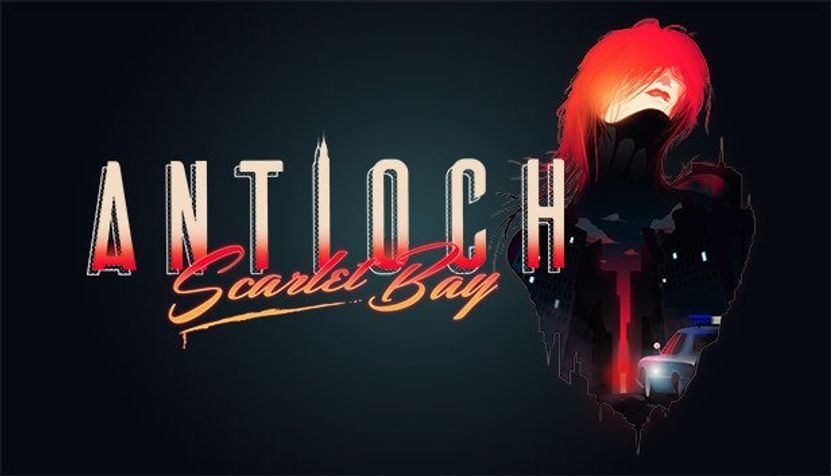Antioch Scarlet Bay
I love mysteries. I love slowly tugging at the threads of a narrative and following them to their source to see what they unravel. It’s especially fantastic when the mystery is set in an incredible setting. Though it’s almost cliche at this point, there is something delightful about a noir mystery, complete with rain, gruff voices, and the all-pervading darkness. Mysteries are at their best when they exist just on the outskirts of the real world, poking at our sense of the known and the unknown with a soft, knowing smile and beckoning us forward.
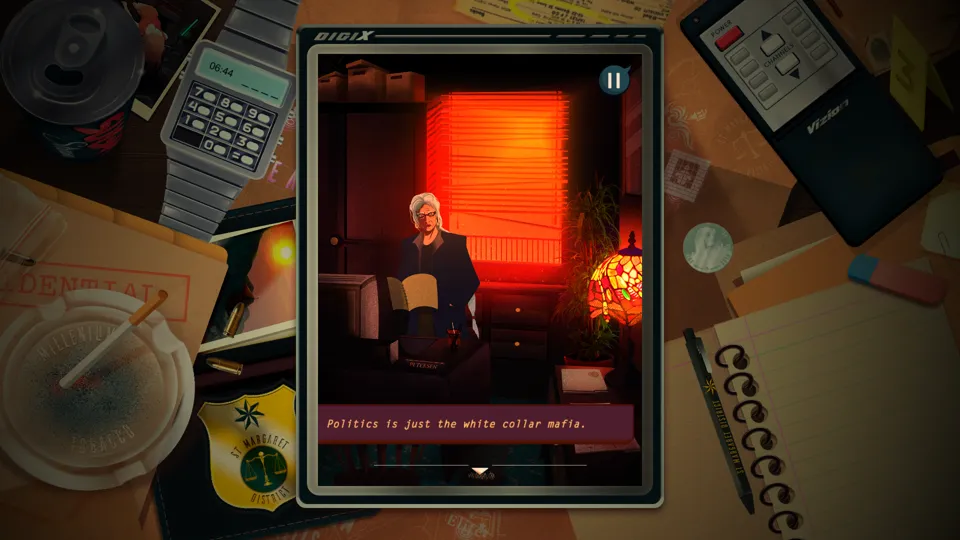 Next, I’ll puff on my cigarette and say “The dame was trouble from the start.”
Next, I’ll puff on my cigarette and say “The dame was trouble from the start.”
The world Antioch: Scarlet Bay creates fits perfectly within this mould. It is a world of darkness, rain, and neon lights. It’s a world hazy with sin, but still populated by people, real and struggling to get by, peering out from behind every seedy corner. It’s a world of gruff, jaded detectives, and of optimistic newcomers hoping to fight the pervasive stain of corruption, but perhaps knowing in their heart of hearts that the fight was lost before it even began.
You play as one of two detectives investigating a murder in the city of Antioch. Interestingly, and perhaps uniquely in the genre, Antioch: Scarlet Bay is a co-op game. One player plays as a fresh-faced, young police officer, investigating their first case, while the other plays as the grizzled veteran one day from retirement. The two players communicate through asking each other questions, proposing actions, and interrogating suspects and witnesses together. As much as Antioch: Scarlet Bay is a game of solving a mystery, it is also a game about building a relationship with a partner and learning more and more about who your character is through their interactions with their partner. The world provides an avenue not only for resolving a story of a corrupt world, but a voyage of self-discovery.
Antioch: Scarlet Bay’s gameplay is almost entirely text-based, with players selecting dialogue options and destinations from a basic map . The only way to move forward is not through any particular gaming skill, but through conversation, deduction, and some degree of teamwork. However, to say that the focus is on the mystery misses the greater story Antioch: Scarlet Bay is telling. The mystery itself was fairly easy to solve (my partner and I figured it out within an hour or so). The difficulty is more in finding the correct evidence and following the correct conversation trails. The joy is in the paths those conversations take and what they reveal both about your partner’s character and your own.
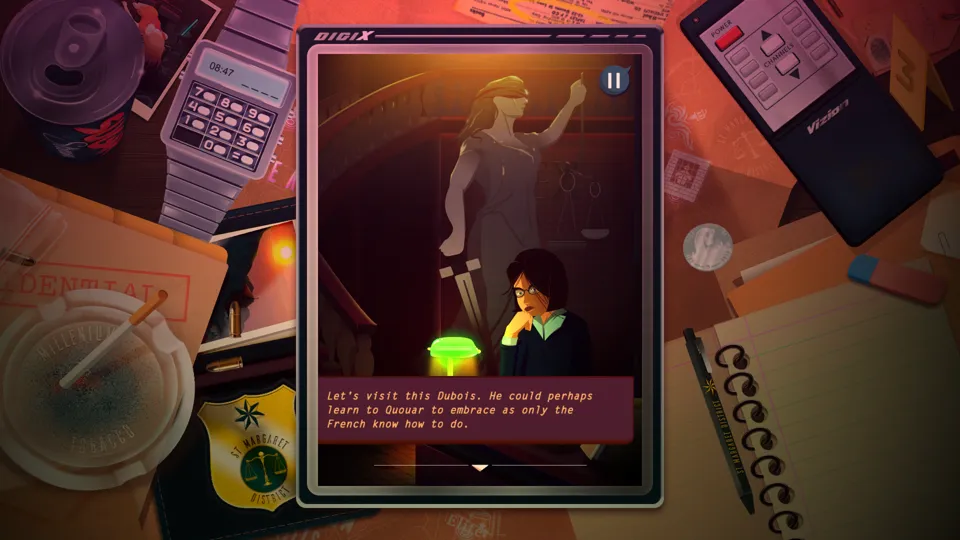 Or you can just admire some bonkers lines.
Or you can just admire some bonkers lines.
For games that rely on their writing to convey their story, it’s obviously necessary for that writing to be effective. For a mystery like the murder at the heart of the game, the writing needs to provide enough clues to create a compelling narrative and to provide the fuel to solve the mystery. There needs to be something to latch on to and provide a sense of accomplishment as the tangled web of secrets unwinds. Equally, Antioch: Scarlet Bay chooses to set its mystery in a compelling world with dual protagonists. The writing needs to carry them as well and create a sense of meaning for the player beyond just solving the mystery. The world needs to feel alive, and the characters within it need to feel as though they are of that world. The success or failure of a game like Antioch: Scarlet Bay is entirely reliant on the strength of its writing.
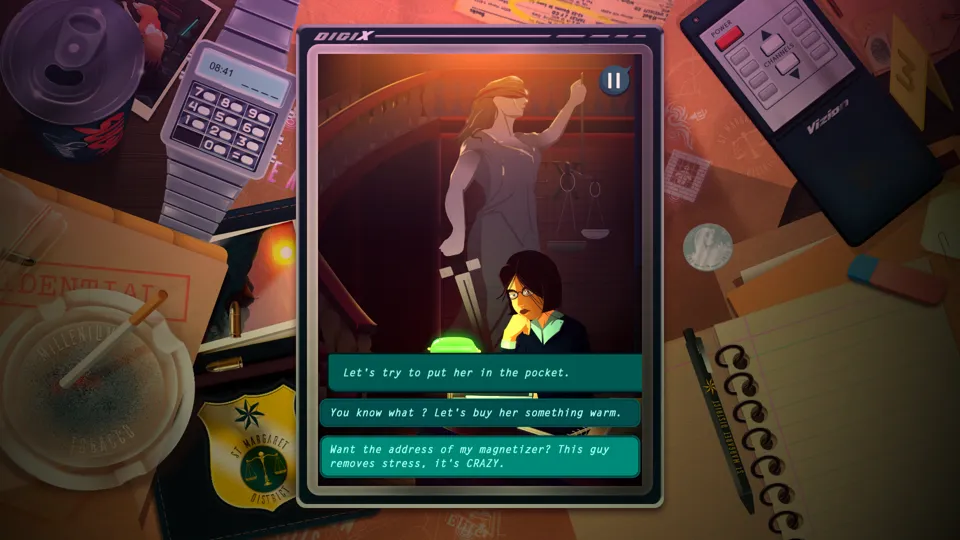 Yes. The writing.
Yes. The writing.
Antioch: Scarlet Bay’s writing is a baffling hodgepodge of poor translation, grandiose worldbuilding, and moon logic. In any given conversation, I wasn’t entirely sure what I was actually meant to be learning, and was never quite sure if this was due to a poor translation or the particular person I was speaking to not actually having any idea what was going on. This is not the first poorly translated game I’ve played, though. A poor translation, even in a game where subtle slips of the tongue make all the difference, isn’t enough to stop me from enjoying the game. Indeed, at multiple points, the writing made me laugh unironically as I enjoyed the characters’ various quips, snide comments, and the way the story was being told.
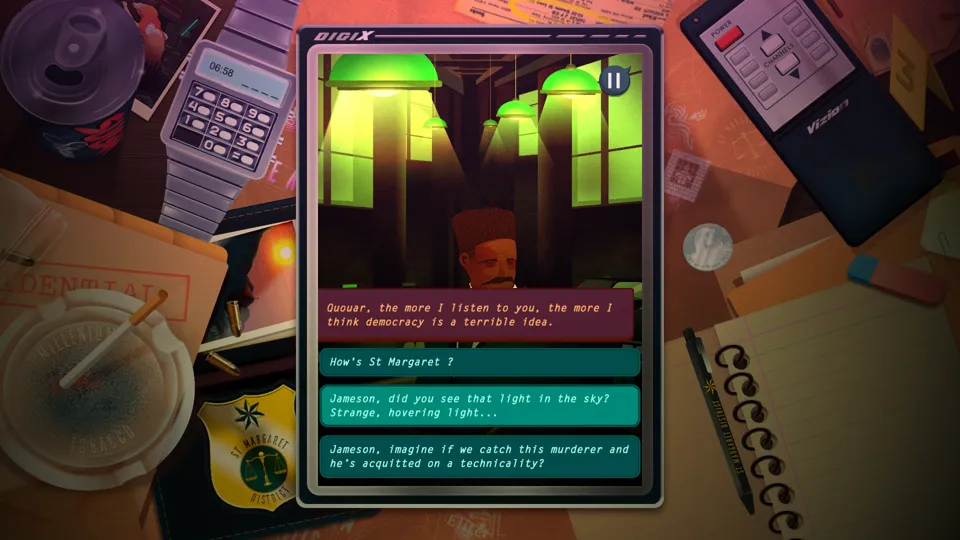 A screenshot from Antioch Scarlet Bay
A screenshot from Antioch Scarlet Bay
However, the writing was not mine to meander through on my own. Antioch: Scarlet Bay is a co-op game, with both players engaging in conversations as they investigate the mystery together. These conversations are not separate. Instead, they happen simultaneously, with one player tracing their line of question, potentially in an unrelated direction from the other player. This leads to absolute madness rather than a coherent line of questioning. Indeed, if one line of questioning ends before the other, the player with no more questions can find themselves forced to do or say things that make no sense for their character, just so the other player can continue their potentially more fruitful line of investigation. This ultimately creates a story that is less the story of two detectives solving a mystery together, and instead creates the story of a straight man gradually losing it as their partner dives headlong into utter madness.
It creates Disco Elysium.
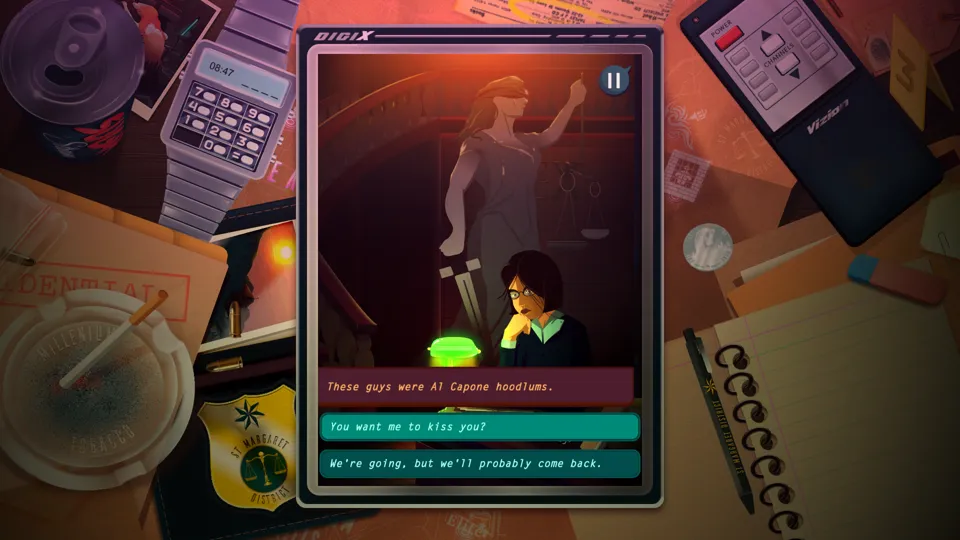 This is not an appropriate response to Al Capone.
This is not an appropriate response to Al Capone.
Much like Antioch: Scarlet Bay, Disco Elysium follows a detective investigating a murder in a world just around the corner from our own. It, like Antioch: Scarlet Bay, has a living and dynamic world filled with characters who are simultaneously compelling and archetypes. It presents the player with the option to have absolute madness conversations as they tug at the threads of their own mystery, and it encourages introspection and self-discovery. They’re both mystery games, heavily reliant on their text.
One key difference, though, is in the player experience. Disco Elysium, like nearly every mystery game, is a single player game. The player plays as Harry and chooses how to approach the mystery on their own. However, Harry is accompanied by a straight-man partner named Kim Kitsuragi who provides a foil to Harry’s more outlandish moments. Together, they work to solve the mystery.
The comparisons draw themselves, but only in the fact that all mystery games must have some commonality. The commonalities between Antioch: Scarlet Bay and Disco Elysium are the commonalities that are likely anywhere in the genre. Instead, I’m bringing up Disco Elysium because both games share the dynamic of working alongside someone else to solve a mystery, and of having the option of bouncing off someone else to be able to do it. The important distinction is to what extent that bouncing and foil ultimately succeeds. In Disco Elysium, Kim Kitsuragi becomes a deeply compelling character in his own right. Though only viewed through Harry’s eyes, Kim is built up and characterised so completely that he feels as whole a character as the Harry the player has built for themselves. In Antioch: Scarlet Bay, there is no such opportunity. Because the dialogue options are so muddled and crossed, it’s impossible for either player to actually build a character for themselves, let alone understand who their partner is. Instead, the partner dynamic becomes one of insanity as one partner desperately tries to stretch out their end of the conversation in the vain hope their partner might gain something. By having both players draw from the same pool of conversation options, conversations cease to be conversation, and become mindlessly clicking with the occasional giggle at a particular line.
This is not to fault Antioch: Scarlet Bay for not being Disco Elysium. Disco Elysium is a modern classic, and each game should and must be its own enterprise. However, it is telling that the element that seeks to set Antioch: Scarlet Bay apart - the fact that you play alongside another human - is so fundamentally flawed in its design that a character wholly pre-written is more human than the one controlled by a person. In trying to create a system where two characters can interact with each other, Antioch: Scarlet Bay instead succeeds only in creating disjointed one-liners and a pair of detectives so incompetent, it’s a miracle they can successfully buy a box of doughnuts.
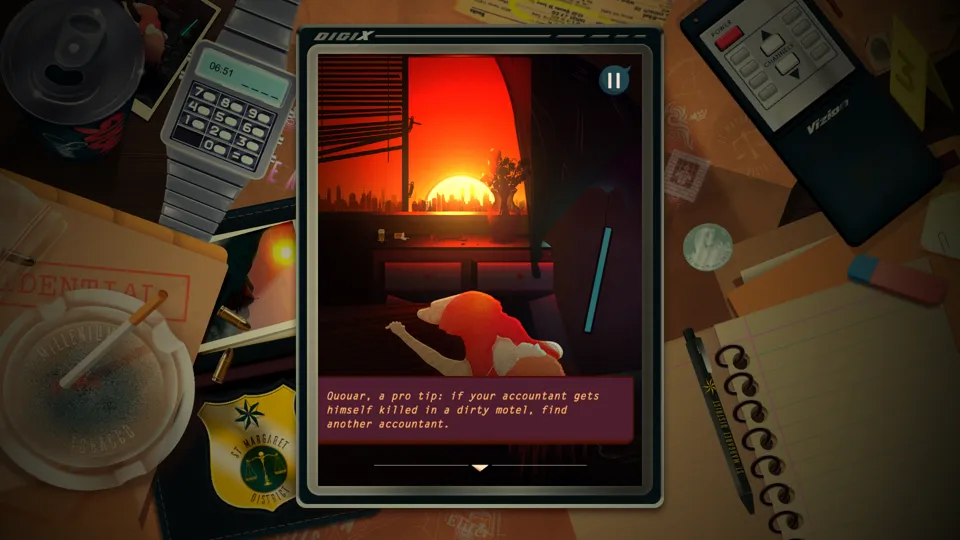 A screenshot from Antioch Scarlet Bay
A screenshot from Antioch Scarlet Bay
And yet, I can’t deny I had fun. I played for roughly three hours before I got to an ending. I felt satisfied by that ending, where even the fail state felt like it fit within the world the game had created. The art is beautiful, and the music creates the perfect atmosphere. I sat beside my partner, absolutely engage for those three hours, having a wonderful time of laughing both with and at the game. As flawed as Antioch: Scarlet Bay may be, and as much as it fails to accomplish what it sets out to accomplish, there is a lot to love. It is an adventure in patience, and an exploration of a world that aches to be explored.
Developer: Midnight Mood Studios
Genre: Detective, Co-Op
Year: 2022
Country: France
Language: English-Ish
Play Time: 8 Hours
Youtube: https://youtu.be/TCtGXVcNXXM
